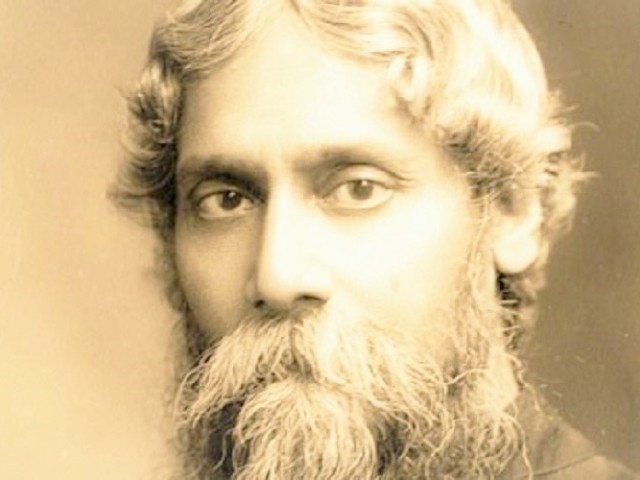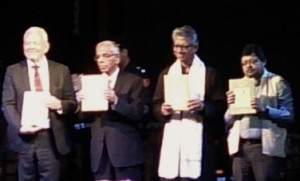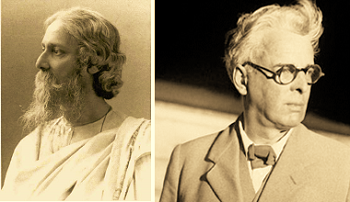Tagore and the Nobel – 100 Years, Hence

THE POET, THE PRIZE, AND ITS PEDAGOGY
“because of his profoundly sensitive, fresh and beautiful verse, by which, with consummate skill, he has made his poetic thought, expressed in his own English words, a part of the literature of the West”- The Nobel Committee of the Swedish Academy on awarding the Nobel Prize for Literature to Sir Rabindranath Tagore.
In a low-key, near surreptitious gathering at the mansion of the Governor of Bengal, Raj Bhavan, (where press was not called, though S.B. Veda was invited and in attendance) Governor M.K. Narayanan, Harald Sandberg, Ambassador to Sweden, Susanta Duttagupta, Vice-Chancellor of Visva Bharati University, and Sabyasachi Basu Roy Chowdhury, Vice Chancellor of Rabindra Bharati University – all marked January 29th, 1914, the day that Rabindranath Tagore received his Nobel Prize Medal from Esme William Howard, 1st Baron Howard of Penrith, head of the UK diplomatic mission to the King of Sweden, who had accepted it on Tagore’s behalf in Sweden in 1913 at the awarding ceremony in Stockholm.
Tagore had not travelled to Sweden to accept it himself, so the British Envoy to Sweden came to India in the new-year to present the medal to him in a ceremony at Government House (the colonial name for Raj Bhavan).
The ceremony marking 100 years of this event, began after a sombre inauguration of a historical exhibit on the occasion by Sharmila Tagore and the cultural program, which followed was emceed by well-known actor and orator Sathinath Mukhopadhyay.
The affair had been kept low-key, perhaps, because a similar attempt to mark the centenary of Tagore’s triumph, met with controversy when President Pranab Mukherjee arrived at Visva Bharati University in Santiniketan during the prior year to mark to the occasion with great fanfare. Many experts waxed sarcastically, alluding to Tagore’s medal being stolen at Rabindra Bhavan where Mukherjee had gone to mark the occasion as being indicative of that institution’s incompetence in safeguarding its most prized material treasure.

Left to Right: Harald Sandberg, M.K. Narayanan, Susanta Duttagupta, and Sabyasachi Basu Roy Chowdhury
This time, the dignitaries kept to a discussion of Rabindranath’s accomplishments. Dr. Duttagupta remarked on the relevance of Tagore in today’s world, his internationalism, his anti-nationalism, and his modern ideas. His counterpart at Rabindra-Bharati expounded on the unfortunate facts of how people in his home country, Bengal in particular, tried to minimize the accomplishment by saying that the award was won due to lobbying by Rabindranath, and that the Nobel Committee were impressed more by the translations and revisions, which were done by the Irish Poet W.B. Yeats, whose contributions to the adaptation both Rabindranath and he have acknowledged. Harald Sandberg spoke briefly about Tagore’s impact on Sweden during his two trips there in the 1920s, how the poet and internationalist saw cultural exchange as a means of improving relations between countries, at a time when ‘Cricket Diplomacy’ would certainly have been regarded in the same breath as the mutterings of a fool.
Governor Narayanan spoke on Tagore’s importance to India, 100 years after he became known in the West.
Published in 1912, ‘Song Offerings’, which was Rabindranath Tagore’s adaptation of his collection of 157 Bengali language poems, compiled in the book, ‘Gitanjali’ astounded William Butler Yeats, and he helped popularize it after it was first published by The India Society in 1913. He wrote the Introduction of the famous reprint, which was published later in the year by The MacMillan Company.
Yeats had been introduced to the work by William Rothstein, an artist, who met Rabindranath during a visit to Jorasanko, the Tagore family ancestral home, where he had gone to exchange ideas about art and learn technique from Rabindranath’s painter nephews, Gaganendranath and Abanindranath Tagore, who were stalwarts of the Bengal School of Art. But he was profoundly impressed by the mystical nature and charisma of Rabindranath, asking the poet to pose for a sketch.
Learning that the sagely and kingly Rabindranath was a poet, Rothstein read his works. Impressed, he introduced it to his friend, Yeats, who wrote the introduction to ‘Song Offerings’ as a note to Rothstein. Yeats Rothstein and Ezra Pound to whom they introduced Tagore’s writings, raved about their new ‘find’ to the literati of Europe.
Europe was going through a period of great tension at the time, on the brink of the global conflict of World War I. Starved of spirituality, Tagore’s naturalistic verses soothed the aching souls of the European artistic elite. It was not long before he was being hailed as the most profound poet ever to have lived – a wise man from the East, in the truest sense.
Events moved at a break-neck pace and, within a year, Tagore had won the Nobel Prize, to his own amazement. Those who say that this was due to lobbying efforts by Rabindranath are certainly ignorant of the nomination process – a secret one, in which certain academic institutions and cultural delegates are empowered to nominate. The faculty at nominating institutions familiar with Tagore’s works in Europe were all British – and the British take on Tagore was ambivalent.
LEFT: RABINDRANATH TAGORE,; RIGHT: W.B. YEATS
The British certainly found in him a more appealing figure for the natives to hail, certainly, than the revolutionary Bengalis, who were attempting to eject the British by force of arms. However, his stand opposing the division of Bengal in 1905 had made him persona non grata as an academic as evidenced by British Academia actively campaigning to prevent India’s elite from attending Tagore’s school at Santiniketan in rural Bengal.
In fact, Tagore was on the brink of closing the doors of his school when the prize money from the Nobel, funnelled into its coffers by him, breathed new life into it.
To the West, he embodied the best of what the East had to offer, and came to exemplify all that the West admired about the East. To some extent, Tagore played to this sentiment, becoming increasingly a figure of exoticism and mystery to Western interlocutors. Yeats, who was once floored by Tagore’s poetry, referred to his later works as “sentimental rubbish” that was “tarnishing his reputation”. These words are oft used to ‘put the finish on the tarnish; by Tagore’s critics but they fail to understand that Yeats’ frustration with Tagore came from a place of deep appreciation of his works and admiration for the man, personally.
If his words were losing their lustre with time, in his deeds, a revolutionary and principled form of nationalism was being exhibited – a dignified expression less the jingoism and tribalism observed across Europe during this period. He was assuming his role as elder Statesman in the world of letters, leader of the very Bengali intelligentsia which had sought to marginalize him when he dared deviate from the ‘chaste’ form of the language in his prose and poetry.
Unlike other Indian Nobel Prize Winners (Amartya Sen comes to mind) Rabindranath was not afraid to tell truth to the reigning monarchy. When the British banned public gatherings and Brigadier General Dyer massacred some 379 Punjabis at Jalianwallah Bagh (causing 1576 casualties in total) some five and a half years after he won the Nobel, Rabindranath travelled immediately from Santiniketan to Calcutta where he tried to organize a rally in protest. The Bengali establishment had been cowed by the draconian measures of the British, signifying that the ‘example’ that Dyer had tried to make of the peaceful Punjabis was working on some level across the breadth of the sub-continent.
Determined to something radical when others were too afraid, Rabindranath Tagore, already the first non-European to win the Nobel Prize, became the only man in history to renounce a Knighthood from the British Crown. Rabindranath, scion of landed gentry, the paradoxical mystic, whose austere words had placed nature above materialism, renunciation above wealth and power, had finally lived up to the spirit of Gitanjali.
People can debate the import of his words, the worthiness of his of them in garnering him the most prestigious prize offered to a man of letters – no doubt they will continue to do so – but one not deny his actions, which were truly historic and principled in a way that we do not see, today. How many have the courage of their convictions? How many Nobel Lauriates and other celebrities are willing to part with state honours to take a stand?
Today we remember that a mere medal alone did not make Rabindranath Tagore a great man. And, the amalgam of his beautiful words as well as his principled deeds, much more so than a gold Medallion awarded by the West, ought better be considered as the critical content of his enduring legacy.
 The Global Calcuttan Magazine
The Global Calcuttan Magazine 
Another great article! I love this magazine!
I love the look – clean, classic, cool – and no annoying pop-up ads. How long can you keep it this way? I think you could use Wikipedia as a model in that they run on voluntary reader contributions.
I was there at Raj Bhavan, and Sharmila left so quickly..didn’t stay for the program. It’s really too bad since she is a Tagore. Also, like what you said about Amartya Sen..needed saying.
She’s an actress, a star…nuff said!
Wonderfully written! I had no idea about the nobel selection process. was really informative! Keep it up! And I’m a Global Calcuttan for sure. When are you going to get your book club going and your picks? Want to join as I travel so much and am always reading on the plane.
Thanks so much for your kind words. Please e-mail us at books@globalcalcuttan.com, so we can inform you of developments.
g
thanks for this
Nice job on the article. Like others I appreciate austere look and absence of ads. Really well done on the whole magazine! I will like this on FB and add to RSS feed.
As a polyglot (I know seven languages, including Bengali) I can confidently say that Tagore’s poetry cannot be fully appreciated in any language other than Bengali. Even his own translations in English, much less those done by others in other languages do not do begin do a proper rendering of the work. So, his winning the Nobel is ironic in that it recognizes tiniest of his capabilities. There was nobody before him in India; there will likely be nobody to follow.
Thanks for your kind words. We agree 100% on Tagore’s works and Bengali.
At Kalam, the main literary festival in Calcutta, we spoke to several young writers, who were excited about the prospect of translating Tagore in contemporary language….takin gout the “thou hast” this and “thy” that, etc. So, maybe we’ll see better translations forthcoming.
I heard on FB that you were going to launch a book and travel club. I think that’s a great idea. I travel a lot and books are my constant companions! Again, love the originality of it all. Please let me know how to join: rupesh.joshi@mail.com
You heard right. And yes…that’s books and travel connected together as so many of us read while we are in transit. We’d like to launch it from London where our managing editor, S.B. Veda will be journeying to finish his novel. He will be writing about the experience on the web-site, and given that London is such a great place for publishing, we hope to launch the club from there in March/April. We hope to get some writers and people in the publishing industry involved.
Another great post! And, I love the pic in the Indian Museum story. PM and CM, WB looking thoroughly bored, and wanting to be some place else, while pontificating on the importance of museums. They both look like they belong in one – Manmohan in ancient history, and Mamata in wax!
I am also interested in the trvel/book club. mail me pls. roy.dhillon@yahoo.com
Thanks. Pleas keep reading, and thanks for your humorous take on the pic. We were going for just that!
Yes…I am interested in the travel/ book club. are they separate or combining books and travel. I think the latter would be a great idea as I’ve never seen it before. How do you keep your site ad-free? I’m not complaining, it’s really refreshing. I hate pop-ups, banners and any ad that I click by accident. Keep up the good work.
Where is this mamata/manmohan article? I didn’t see it in posts.
Hi Dr. Singh, thanks for being a loyal reader. Here is the link: https://theglobalcalcuttan.com/?page_id=466 You can find it under the drop-down menu culture, under sub-menu art. We’re trying to keep ourselves ad free, without even google ads and sponsored links, so most likely contributions will be sought but only on a voluntary basis. We firmly believe that you should enjoy the content first, and then decide if it was worth giving something back for it.
https://theglobalcalcuttan.com/?page_id=466
yes.
Did anyone notice the swipe he took at Larry Page and Google regarding satellites and balloons – that’s a Google idea to increase penetration of the net.
yes…our mobile correspondent will respond
DARUN! What an extraordinarily well-written article! Truly worthy of Rabindranath. Pleasure to read.
Tagore is the best!
He is my Guru
Nicely written! Tagore’s legacy is felt all over the world. Thanks for this.
There was nobody like him before. There will be nobody afterwards. That’s called GENIUS!
Sangathik! He was the master.
Still is the King!
we think so
This site was… how do you say it? Relevant!! Finally I’ve found something that
helped me. Thank you!
This is a truly wonderful article about a great man! I thank you for writing this piece. It is so fashionable, these days to trash Tagore – and it’s too easy. It’s refreshing to see someone write so well about this topic with this point of view. I”m adding you to my RSS Feed. Keep posting!
I concur. This article is probably the best article on Tagore that I’ve read since I can remember. Keep it up
Khub Bhalo! You r doing gr8!!! Keep going.
A magnificent piece about a magnificent man! Really enjoyed it!
Nice article, really I like it. ”Unlike other Indian Nobel Prize Winners (Amartya Sen comes to mind) Rabindranath was not afraid to tell truth to the reigning monarchy.” yes, Rabindranath and Amartya Sen… are great Indian, we pride for the.
Your article shows how Tagore was unique and multitalented not seen before. Keep up the good work.
Thanks for your feedback. Please keep reading. The Global Calcuttan.